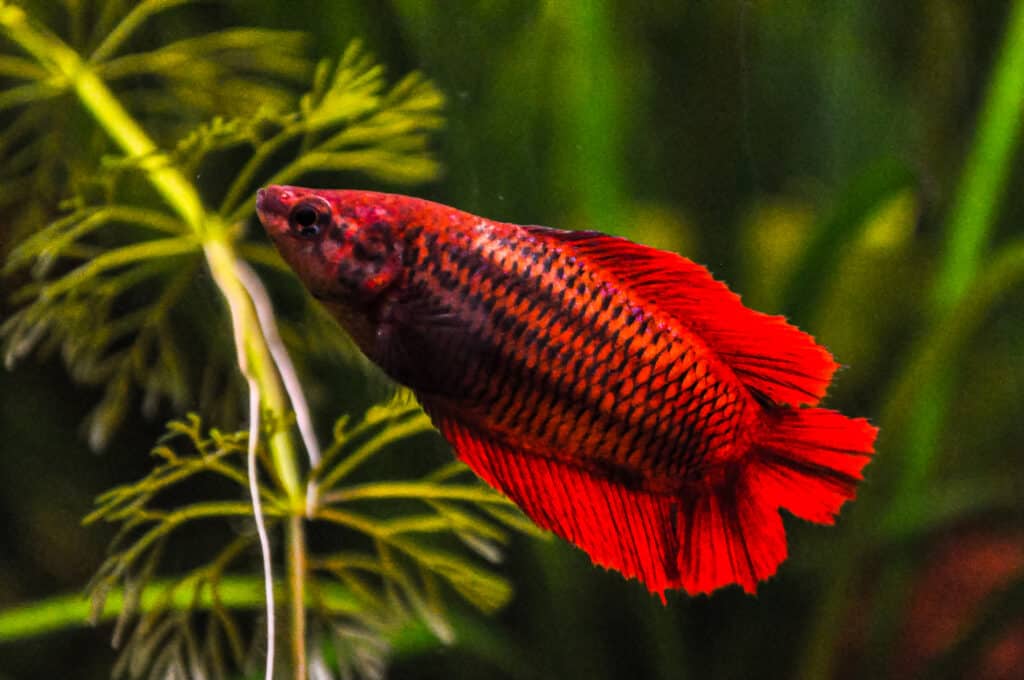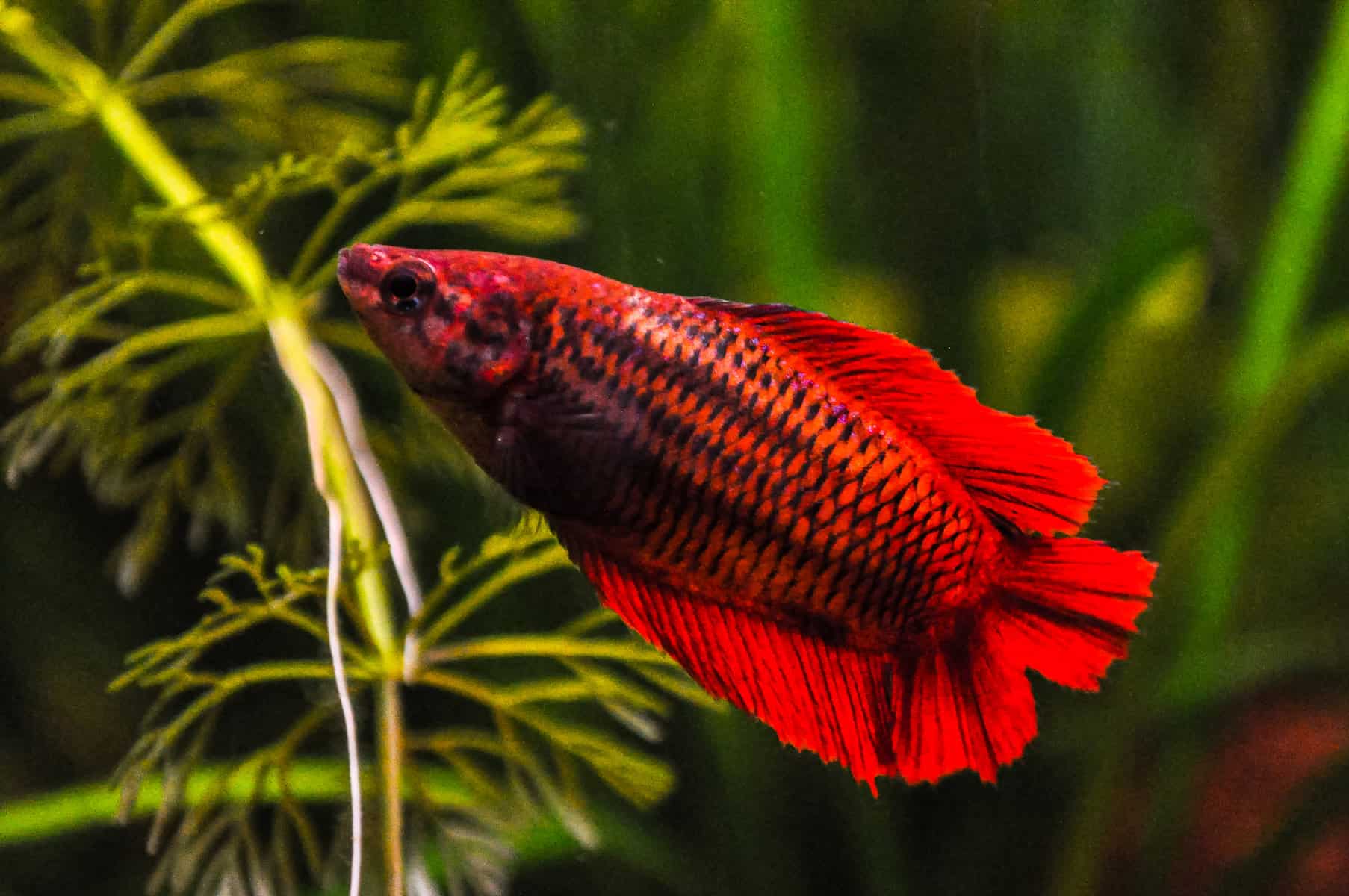Like many betta fish owners, you might wonder if your beloved pet takes time to hibernate during winter.
But do bettas notice the changing seasons from within their tank? If you don’t provide a heater for your betta tank, will your pet hibernate during the wintertime? And how can you tell if your betta fish is sleeping, hibernating, or sick?
Read this guide to find out if betta fish actually hibernate or if you simply have a lazy betta!
Do Betta Fish Hibernate?
First, let’s cut to the chase and answer the question, “Do betta fish hibernate?”
No. Betta fish don’t hibernate during the colder months of the year.
If your betta is kept indoors in warm water in a heated tank with a lighting unit that’s on for the same number of hours each day, your fishy friend has no way of knowing that the seasons are changing outside.
Temperature Shock
Although it is true that Siamese fighting fish become inactive when the water temperature drops, that’s due to temperature shock and not because your fish is hibernating.
Betta fish are a tropical species that should ideally be kept in a heated tank with a water temperature of 78° to 80° Fahrenheit (25.5° to 26.5 Celsius). If the temperature drops below that, your betta will start to suffer.
Your pet’s metabolism will slow down in cool water temperatures, and the fish will ultimately go into temperature shock. Temperature shock is highly dangerous to bettas.
So, you should have an aquarium thermometer installed in your tank to monitor the water temperature daily.
If the water temperature drops below the 78° to 80° Fahrenheit sweet spot, you must take action immediately to save your fish.
- Check that your heater is not faulty. If you think your heater is not working correctly, buy a replacement immediately.
- You can warm the water immediately by carrying out partial water changes and replacing up to 30% of the volume with warmer water while you work out a permanent fix.
- Wrap the tank in blankets to help retain as much heat as possible.
Be careful not to heat the water too quickly, as that can stress your betta, causing more problems.
Is Your Betta Simply Sleeping?
Of course, your betta fish might just be sleeping rather than hibernating.
Bettas are diurnal rather than nocturnal fish. This means bettas are most active early in the morning and throughout the day. So, just like you, your betta spends the night resting or sleeping.
However, bettas are quite lazy fish and nap throughout the day. Sometimes, you’ll notice your betta pet lounging on a flat plant leaf for a while, floating motionless in the water, or even laying on the substrate.
Is My Betta Asleep?
So, how do you tell if your betta fish is asleep?
Take a close look at your betta pet when he’s resting. You should be able to see clear signs of breathing. Your fish’s gills should move very slightly, and his mouth should open and close.
Bettas don’t close their eyes while sleeping simply because these fish don’t have eyelids.
So, if your fish is stationary for any length of time, he’s most likely sleeping.
How Long Do Betta Fish Sleep For?
How many hours of sleep your betta needs largely depends on the fish, and there can be wide variations in the sleep schedule of individual bettas.
Typically, betta fish are relatively active, spending much of their time patrolling their territory. These are curious fish that enjoy exploring their environment between bouts of napping.
So, if your betta suddenly becomes less active than usual, that could be a red flag that something is wrong.
Young bettas are generally more active and sleep less than seniors. Some betta fish love interacting with their owners, swimming up and down the tank when you approach or even following your finger along the viewing panes.
In contrast, other bettas are downright lazy and show no interest in anything much except at feeding times.
Why Is My Betta Fish Sleeping So Much?
If you’re concerned that your betta sleeping too much, you need to double-check that everything is okay with him.
Tank Temperature
As previously mentioned, ensure your betta’s tank is not too cold. The ideal temperature for a betta tank should be between 78° and 80° Fahrenheit (25.5° to 26.5 Celsius).
If the tank is colder, your betta could suffer from cold temperature shock, and you must take the actions recommended above to remedy the situation as quickly as possible.
Too Little Light
It’s important that your betta has a clear night and day schedule.
When the environment becomes light in the morning, fish know it’s time to become active and feed. In the evening, when the light fades, the fish understand that it’s time to rest and sleep.
Ideally, your betta tank should get 8 to 10 hours of light daily. This is essential if you have living plants in the tank, as plants use light for the process of photosynthesis. Without enough light, the plants won’t thrive.
If you leave your aquarium lights off for too long, your betta might think he needs to sleep more. Dim lighting or too many floating plants cutting off the light can have the same effect of disrupting your pet’s sleeping pattern.
Is Your Betta Bored?
Betta fish are intelligent fish that can be trained to perform simple tricks, such as jumping through hoops!
In the wild environment, bettas are kept busy exploring their environment, patrolling and defending their territory, hunting for food, etc. If you don’t provide a captive betta with enough stimulation, he will almost certainly become bored and sleep more.
Spice up your betta pet’s life by adding plenty of plants decorations and a few peaceful tank mates to betta tank to keep him entertained.
Is Your Betta Sick?
Sometimes, sleeping a lot can signal that your betta is sick.
Look carefully to see if your pet is exhibiting any other symptoms, such as a loss of appetite, inability to swim on an even keel, swellings or sores on the skin, etc. There are lots of common fish diseases that can affect bettas.
You can read more about the diseases affecting your betta fish and find out how to treat them in the article at this link.
Is Your Betta a Senior?
Betta fish have a relatively short normal lifespan of two to five years.
If you’ve had your beloved betta buddy for a few years, it’s perfectly normal behavior for him to need more sleep. In this case, just let your fishy friend get the rest he needs and don’t hassle him!
Is Your Betta Just Lazy?
Just like people, some betta fish are just plain lazy, preferring to spend their days napping and enjoying a lie-in most days.
That’s okay, but be aware that betta fish can become obese and unhealthy if they don’t exercise enough.
Bettas are also very food-motivated and quite greedy fish. So, you can use that trait to increase your pet’s activity levels.
You can use this simple trick to give your fish a little extra interactive exercise:
- Take a piece of freeze-dried bloodworm, soak it in tank water, and stick it to the end of your finger. Now, pull your finger slowly across the top of the water to encourage your betta to follow the treat.
If you do that every day for a few minutes, your betta will get a mini-workout with a reward at the end of it. Of course, there’s always the risk that your fish will need even more sleep to recover from his visit to the “gym!”
Final Thoughts
Did you enjoy our guide to betta fish hibernation? If you found the article interesting, please take a moment to share it before you go!
Bettas have a normal nighttime sleeping cycle and take lots of short naps throughout the day. Since your betta lives indoors in a climate-controlled fish tank, your fishy friend has no concept of the changing seasons, so he does not need to hibernate.
In addition, bettas are tropical fish that suffer from temperature shock if exposed to cooler water conditions.
So, betta fish do not hibernate.
Does your betta sleep a lot? Tell us about your fishy friend in the comments box below.

